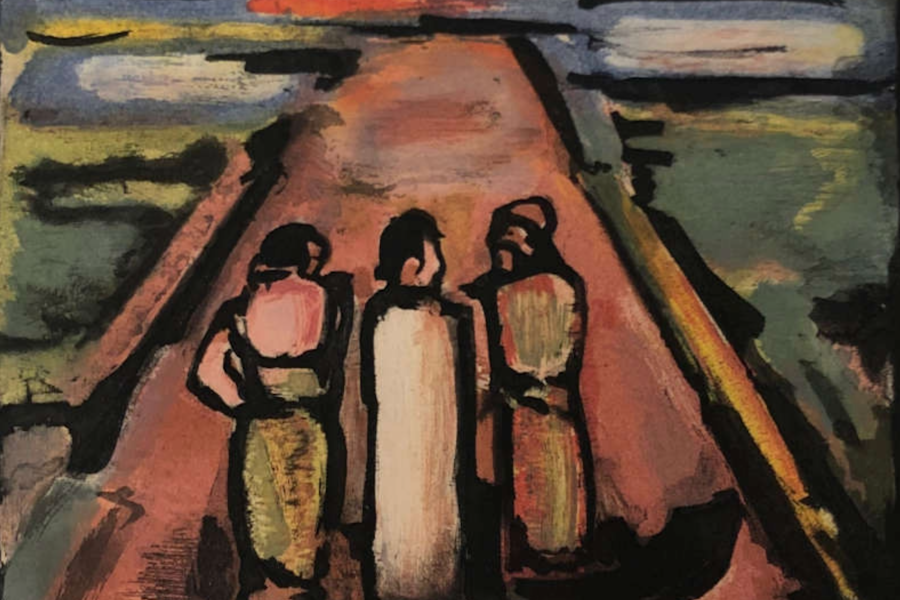Now on that same day two of them were going to a village called Emmaus, about seven miles from Jerusalem, and talking with each other about all these things that had happened. Luke 24: 13 – 14
The identities of the “two of them” have stumped Christians through the years. Is Cleopas the same man as Clopas — husband to one of the Marys at the cross (John 19:25)? If so, perhaps Mary was the second person walking on the road. It certainly would make sense that a husband and wife who had both been devoted followers of Jesus would pack up on that Sunday afternoon and escape from the turmoil in Jerusalem together.
I am just speculating, but it helps us to imagine the nature of their conversation as they walked along, “talking and debating.” I can see a husband and wife rehashing the events, processing their feelings. The weekend had left them in shock. John mentions that Mary (wife of Clopas) was witness to the horrifying images of Golgotha.
Cleopas might have wondered if he and the others should have seen it coming. Could they have done something to prevent such a thing from happening?
She would have been replaying what she saw with her own eyes and the hurt she felt when the disciples discounted the report she and her friends brought back from the empty tomb.
Why didn’t you speak up? You just went along with the others — as if the women of our group were silly or unreliable. You should have at least gone with Peter and John to see for yourself.
I know. I’m sorry. I was confused.
They were both terribly confused. But the overriding sentiment as they walked was disappointment. Terrible, empty disappointment.
They had felt so certain that Jesus was the Messiah.
Maybe that’s what their conversation was like. Maybe not. What we do know is that when Jesus walked up, they didn’t recognize him. Either they were too engrossed in conversation, or they were embarrassed that their conversation was heated, or something else. Scripture simply says that they “were kept from recognizing him.” Something about Jesus’ identity was temporarily obscured.
Jesus kick-starts the conversation: “What are y’all talking about?”
Cleopas is stunned. “Are you the only person in Jerusalem who doesn’t know what all has happened?”
“What? What has happened?”
Then one of them tells the tragic tale of the man Jesus, who was an amazing teacher and prophet, able to heal and work miracles. “We had hoped that he was the one who was going to redeem Israel.”
At this point, we expect Jesus to uncover his head and look them straight in the eye, and say, Look, friends! It’s me…Jesus! But he didn’t.
Instead, he chides them, “How foolish you are, and how slow to believe all that the prophets have spoken!”
And for the rest of the walk — seven long miles — he recaps all the pieces of their own Jewish story, episode by episode, from Moses all the way through the prophets who foretold about his coming. Stingingly poignant in light of the week’s events. All of the scripture converged at the same place: in Him.
But still, no reveal. The fiery influence of the Holy Spirit was burning inside both of them, but they still did not perceive the reality of Jesus’ living presence.
By sundown, Emmaus was on the horizon. They came to their house. And then Jesus did a most unlikely thing. In Greek it says he pretended that he needed to continue on his way. Why? What was to be gained by putting them in the position of having to invite him in or not? If he wasn’t going to reveal who he was, why prolong the visit?
They must have been drawn to this stranger. As tired as they were, they did invite him to come in. In fact, they insisted that he stay for supper. He entered their home, and a simple meal was laid out on a table. Ordinarily, the host would have prayed and then passed the food. But in a twist of protocol, Jesus, their guest, picked up the loaf of bread, blessed it and broke it, and gave it to them.
And in that instant they recognized him.
What was it that triggered their awareness? Had they witnessed Jesus tear a little boy’s loaves and fish and feed five thousand people? Or maybe they had heard of him breaking the Passover bread, saying, “This is my body broken for you.” Or maybe they noticed that the hands breaking bread still bore the scars where nails had been. And so they saw Jesus for who he was. At that moment they believed in the Risen Lord.
I want to go back and talk about Luke’s choice not to name Cleopas’ companion. I have imagined it to be his wife. But why did Luke not say?
It wasn’t because he didn’t know. Surely it wasn’t a failure to include details — of all the gospels Luke’s is the longest and includes the most specifics by far, including names. And it most certainly was not because Luke discounted women; he is the one who repeatedly describes the attention Jesus gave to women and children.
What if Luke deliberately chose to let his readers fill in the blank? What if he intended that we would see ourselves on this road?
The experience of this traveler may well be like your own. You may be the unnamed one. You may know a lot about Jesus. From church, from home, from the Bible, or from TV — who knows where we get our images of him. You may know a lot, and you may care a lot about Jesus and Christianity.
But do you ever feel disappointed that God is not making things happen the way you thought he would? That your life has not turned out the way you had hoped?
Have you been confused about where Jesus is during difficult times?
Does it sometimes seem that as much as you believe Jesus is the Son of God, his promises of lighter burdens, of peace, answered prayers, and freedom from fear are not a reality for you?
Then you are right there on this long walk — needing Jesus to come alongside you and help you to recognize his presence.
But it’s a process. He wants to walk you through your doubts and disappointments. He wants to take you back through the story of God’s interaction with people from the very beginning and to see how it matches your own story. He wants to be invited into your home to share your everyday life.
And at some point, if you have ears that want to hear, eyes that want to see, you will know he is alive and is with you. In the simplest act — a song, a prayer, a long-forgotten Bible verse, a meal — you will know him as the one who gave himself for you.
Taken from “Ongoing Easter” (sermon) by Rev. Toni Pate, April 7, 2024. Used with permission.
Image: Road to Emmaus, 1936, by Georges Rouault (French, 1871 – 1958). Courtesy of RISD Museum.
· Last Featured on Renovare.org April 2024


